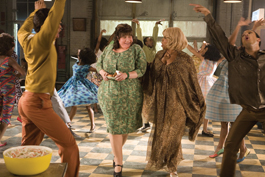home | metro santa cruz index | movies | current reviews | film review

Sing it, SISTER: Edna Turnblad (John Travolta, left) and Motormouth Maybelle (Queen Latifah) trip the light fantastic in 'Hairspray.'
Big Girl Now
'Hairspray' grows up to be a fast, funny movie
By Richard von Busack
Within its limits—the limits of a showbiz musical—Hairspray is a masterpiece. It is the kind of exuberant, fast and funny musical that has seemed extinct since the 1950s. The color is vibrant, with clouds of aerosol hairspray acting like dry-ice smoke to take the edge off them. The costumes are streamlined and deliciously shiny. Based on John Waters' semiunderground comedy film and the Broadway musical it spawned, Hairspray has the age-old plot of the young girl who longs to be a star. In 1962, the chunky Tracy Turnblad's aims are as small as her frame is big; she (newcomer Nikki Blonsky) and her best pal, Penny (Amanda Bynes), long to be on The Corny Collins Show, the TV dance program. Tracy muscles in on the popularity of the queen of the show, Amber (Brittany Snow), and her evil stage mom, Velma (Michelle Pfeiffer, who delivers a delicious speak-singing Eartha Kitt–style song about her days as "Miss Baltimore Crab").
What should be agrexeable piffle begins to grow more serious when Tracy uses her popularity to call for the end of racial segregation on the show. "Negro Day" is one day a month, and Tracy claims soulfully, "I wish every day was Negro Day." She meets Seaweed (Elijah Kelly) and his sister, Little Inez (Taylor Parks), whose mother is Motormouth Maybelle, Negro Day's host. And what started as a story of personal ambition turns into a gently satirical look at the Civil Rights movement. The musical celebrates how the 1960s tackled the idea that there was just one way to be beautiful. Director/choreographer Adam Shankman carries out Hairspray in what could be called a neoclassical style. After the fidgety, exhausting camerawork of purported knockouts like Moulin Rouge!, Chicago and Dreamgirls, Shankman does what Stanley Donen would have done: he hangs back, occasionally adjusting the angle with a crane shot, and shows us the dancers and singers we came to see.
It will be easy to critique Hairspray as yet more feel-good nostalgia for the age when there was still some optimism about an end to racism. Hairspray includes a but-seriously-folks number, when Queen Latifah's "I Know Where I've Been" is staged with chorus and a candlelight processional. The number hits you right in the brisket, and yet it's not really a love song in this version that is as devastating Toussaint McCall's "Nothing Takes the Place of You" in the original Hairspray. Today's musicals, even the neoclassical ones, don't have good torch songs, but they do have candlelight-processional ones. The closest thing to a serious love ballad comes with the comic duet between Tracy's parents, a fat-suited John Travolta (as mom Edna) and her dad, the splendid Christopher Walken. As for Travolta, his is a transformation more than a performance. The fat suit is 2007's equivalent to blackface, and he's straitjacketed by the makeup. Still, Hairspray shines up the neglected machinery of the Hollywood musical while remaining plenty underground. The emphasis on social justice is all there, but the lusciously thick layer of eye and ear candy is all that most people will notice. In Blonsky, Hairspray has the advantage of a girl who has something to shake; and once audiences see this kind of fat, they may never go back.
![]() HAIRSPRAY
(PG; 107 min.), directed by Adam Shankman, written by Leslie Dixon, John Waters and Mark O'Donnell, photographed by Bojan Bazelli and starring Nikki Blonsky and John Travolta, plays countywide.
HAIRSPRAY
(PG; 107 min.), directed by Adam Shankman, written by Leslie Dixon, John Waters and Mark O'Donnell, photographed by Bojan Bazelli and starring Nikki Blonsky and John Travolta, plays countywide.
Send a letter to the editor about this story.
|
|
|
|
|
|